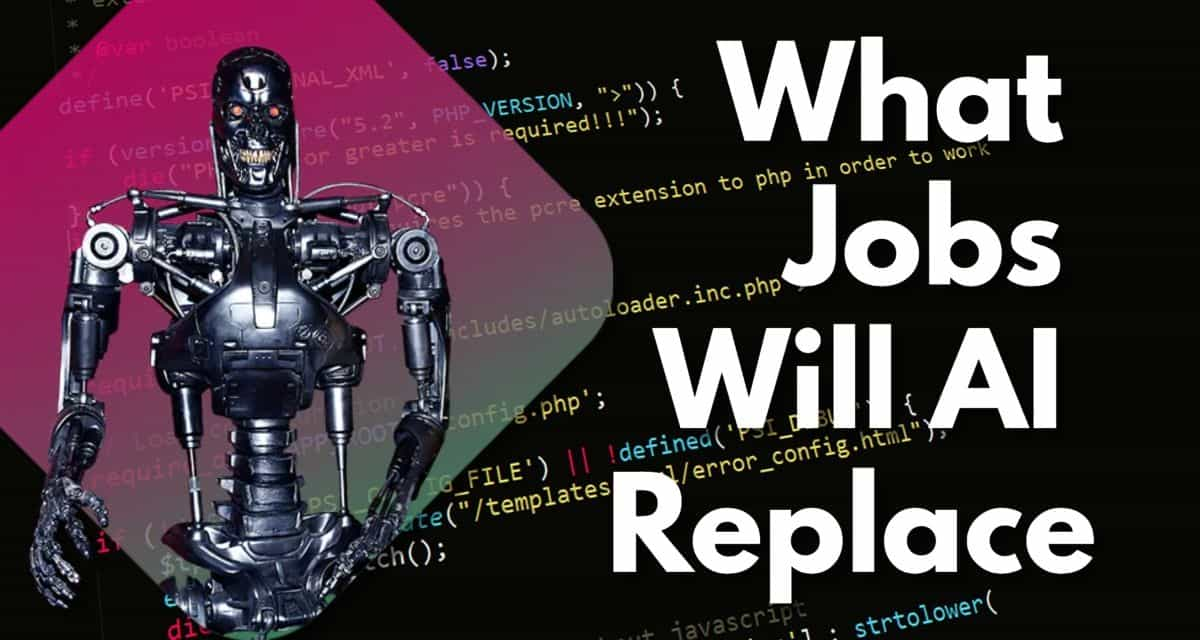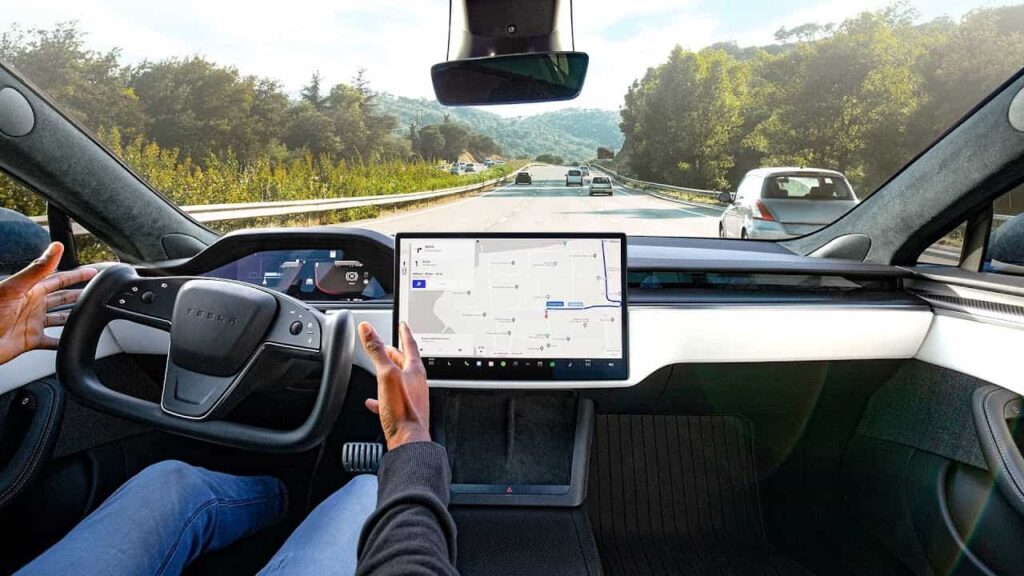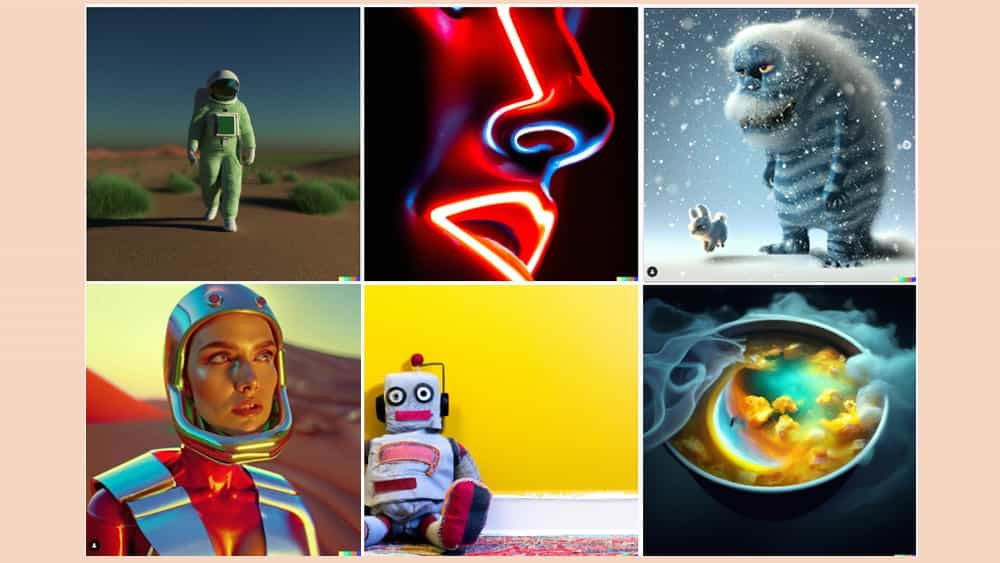What Jobs Will AI Replace – 9 Professions Most At Risk

Artificial Intelligence (AI) is one of the most significant technological advancements of our time. It has the potential to transform various industries, including healthcare, finance, manufacturing, and customer service.
However with the increasing use of AI also raises concerns about its impact on the job market. Many people like you may be worried that AI will replace human workers and lead to massive unemployment.
In this article, I explore the question of what jobs will AI replace and what jobs are likely to remain safe.
What’s The Current State of AI?
AI is the ability of machines to learn from data and perform tasks that typically require human intelligence, such as speech recognition, natural language processing, and decision-making.
AI technologies include machine learning, deep learning, neural networks, and computer vision. Today, AI is being used in various industries, including healthcare, finance, manufacturing, and customer service.
For example, AI-powered robots are used in manufacturing to assemble products faster and more efficiently. In healthcare, AI algorithms are used to analyze medical images and help diagnose diseases.
What Jobs Will AI Replace?
AI has the potential to replace many jobs that are repetitive, routine, or dangerous or jobs that don’t need any physical interaction with tools or other people.
Here are some examples of jobs that are likely to be replaced by AI in the near future:
1. Transportation Jobs
As someone who loves technology and is always keeping up with the latest innovations, I’ve been pretty fascinated by self-driving cars and trucks. The idea of being able to sit back and relax while a car drives me around sounds pretty amazing.
One of the most well-known companies working on self-driving technology is Tesla, founded by the one and only Elon Musk. He’s been a big advocate for self-driving technology, saying that it has the potential to save millions of lives by reducing accidents caused by human error.

And it’s true, these vehicles can operate 24/7 without getting tired or distracted, making them more efficient than human drivers. Plus, they can even be programmed to be more environmentally friendly.
But, as with any new technology, there are also concerns about its safety. There have been some pretty scary accidents involving self-driving cars, including a fatal crash involving a Tesla Model S back in 2016.
Some people argue that the technology isn’t advanced enough yet to be truly safe without human intervention.
And if you think about it, self-driving cars could even be used to deny access to your own car. If there’s a dispute or you fall behind on payments, the car manufacturer or other third parties could use AI to lock you out of your own vehicle. That’s definitely something scary that needs to be addressed.
2. Journalism, advertising, content creation
Media jobs in all areas, including advertising, writing, editing and proofreading, journalism, and any job that involves content creation, may be affected by ChatGPT or ChatGPT alternatives.
This is because AI has already made remarkable advances in the field of writing. It is able to read, write, and understand text-based data well.
With its ability to understand and manage different languages, AI may after 2-3 years replace, in many ways, the jobs of humans involved in writing and editing text.
You may want to check my best AI writing assistants – which I’ve screened through tens of AI writing software.
3. Consulting, finance, data analytics
Because of its ability to track, detect, and examine information, AI poses a threat to those involved in consulting, finance, and quality data analysis.
Companies can program AI to analyze large volumes of data, identify patterns, and make recommendations based on that information.
For example, it can provide insights into customer behavior, market trends, and product performance.
This allows organizations to make informed decisions and save time and resources.
In addition, AI has the ability to automate tasks that were once performed by research analysts. It uses algorithms and machine learning to understand trends and make better predictions than humans.
4. Website Owners And Staff
Chatbots in the form of ChatGPT are a threat to websites as well, as this technology is set to disrupt the search engine industry, and by extension, website traffic and all that it entails.
The two best known and most popular chatbots, ChatGPT for Search Engines and You.com have already integrated their capabilities into Google search in no time at all, through their official browser extensions.
At present, they are not so worrying in my opinion as they will not let the search engines lose their money making model which is advertising.
So, as far as the potential thread to search engines is concerned, it could be said that despite the potential of ChatGPT it still has a long way to go to overcome its limitations.
Even if it starts to provide answers by processing data in real time and always giving correct answers, the technology could not negate the need for search engines.
One main reason for this may be that people have been using search engines for decades, a behavior that took a long time to develop.
Therefore, it may take several years for users to assimilate this change and fully transition to a chatbot.
5. Graphic Designers
In a December 2022 Harvard Business Review post, three professors focused on DALL-E, OpenAI’s now-famous artificial intelligence tool.

They reported that it is the biggest threat to the graphic design industry.
“The intelligent upgrading of the skills of millions of people who create and manipulate images will have a profound impact on the economy,” they wrote, adding that “these recent developments in AI will trigger a period of economic hardship for those in graphic design who are struggling to adapt.”
In addition, AI tools like Adobe Spark and Canva create stunning graphics with minimal effort. The algorithms also analyze designs and suggest changes to create something aligned with industry standards.
This means companies can save costs by hiring fewer designers and getting faster results.
It’s also a cost-effective alternative for smaller companies that may not have the resources to hire a team of designers.
6. Programmers
I believe that programmers are one of the professions that will most probably get affected the most by AI. AI technologies such as automated coding and machine learning algorithms are already being used to create software programs, and the trend is likely to continue in the future.
This could potentially reduce the demand for human programmers, especially for routine coding tasks.
However, I also believe that AI will not replace programmers entirely. Programmers will still be needed to design and implement complex algorithms, debug code, and work on projects that require creativity and problem-solving skills.
In fact, AI could even enhance the work of programmers by automating repetitive tasks and allowing them to focus on more challenging aspects of software development.
7. Accounting – Bookkeeping
Accounting is generally regarded as a stable profession and not so prone to the clever upgrading of chatbots.
However, workers in this industry could be at risk if accounting firm employers decide to invest in AI.
AI has the power to change accounting, as it can do tasks like data entry and number crunching quickly, accurately, and error-free.
Banks are a great example of organizations using AI in their accounts.
8. Customer service departments
This is an industry that has been seeing the impact of AI for a long time.
We’ve probably already experienced a company’s customer service where we get automated and customized responses on a case-by-case basis from a chatbot.
ChatGPT and related technologies could even more effectively continue this trend, dramatically reducing customer service jobs.
A 2022 study by technology research firm Gartner predicted that chatbots will be the primary customer service channel for about 25% of companies by 2027.
9. Social media management
Social media is the modern face of progressive businesses. Artificial intelligence can automate several tasks performed by working social media managers.
For example, AI algorithms can help in scheduling posts, creating and optimizing content, analyzing data and metrics, and tracking customer loyalty across platforms.
AI tools monitor the performance of social media campaigns and make data-driven decisions to improve their impact.
They also determine the most effective time to publish, the best types of content to share, and the target to reach.
With these exceptional capabilities, AI has the potential to significantly increase the reach of social media accounts that companies maintain, making it easier and more effective than ever before.
There are already many AI-powered social media management tools, such as AgoraPulse, Sprout Social, and Buffer, to effectively manage social media accounts.
Jobs that AI Will Likely Not Replace
Despite the potential of AI to automate many jobs, there are some jobs that AI cannot replace. These jobs require human skills such as creativity, empathy, and social intelligence. Here are some examples of jobs that are less likely to be replaced by AI:
1. Healthcare / Nurses, Doctors
I believe that AI cannot replace the human touch in healthcare. While AI can help with tasks such as diagnosing diseases and analyzing medical images, it cannot provide the emotional support and empathy that patients need.
Patients often need someone to talk to, to listen to their concerns, and to offer them reassurance during difficult times. These are all skills that require a human touch and AI will never be able to provide them
For those of you who are going to argue about robots that look like human, I believe that humans will always be able to tell if someone is a robot or not.
2. Education / Teachers
Another field that I believe is not going to be affected by AI is the education sector. Teaching is a highly complex profession that requires a broad range of skills that AI cannot replicate.
While AI can help with tasks such as grading and providing feedback, it cannot replace the human interaction between teachers and students.
Teachers are not just people who have and pass knowledge, but also mentors, role models, and counselors.
They need to be able to tailor their teaching to each individual student, to understand their strengths and weaknesses, and to provide emotional support when needed. These are all skills that require, again, a human touch.
3. Construction / Builders
Lastly is construction works. Everything from a builder to a plumber to an electrician. I can confidently say that these type of jobs are never going to be replaced by AI.
Again, while AI can help with tasks such as project planning and design, it cannot replace the physical labor and problem-solving skills that these kind of jobs bring to the table.
For example, building requires attention to detail, and the ability to problem-solve on the fly. It also requires physical dexterity, strength, and stamina. These are all skills that AI simply cannot replicate.
4. Sales / Affiliate Marketing
I believe that sales, salespersons, and affiliate marketers are also jobs that are less likely to be affected by AI. While AI can help with tasks such as lead generation and data analysis, it cannot replace the human touch in sales and affiliate marketing.
For example, Salespersons need to actually visit their prospect in order to build relations, gain trust and to be able to understand the unique needs of each customer. Prospects feel “safer” and more willing to do business with a person they relate.
To relate with someone you have to actually see him/her.
Similarly, affiliate marketers like me, use AI tools all the time to generate sales for other companies. Even if you develop a super-tool that does everything, you still need a person to operate it.
Finally, affiliate marketers usually influence a specific number of people anad these people know and trust the affiliate/influencer.
Again, here comes the human touch that builds relationships with followers and promote products in an authentic way, something that AI cannot do.
How to Prepare for the Future of Work?
It’s important to recognize that the increasing use of AI in various industries will inevitably change the nature of work, which means we need to be proactive in preparing for the future of work.
Update Your Skills
For example we need to continuously update our skills to keep up with the changing job market. That means focusing on developing skills that are less likely to be automated and learn about AI technologies and how they can be used in our industry.
For example, it is never to late to learn about marketing and sales on how to sell your designs or your services as a freelancer.
Embrace lifelong learning
Another important step is to embrace lifelong learning. This means being willing to learn new skills and adapt to new technologies.
There are so many opportunities out there, like online courses, workshops, and training programs that can help us learn new skills and stay relevant in the job market.
For example, if you are a writer, learning how to use AI technology for producing new content in any niche and form (e.g. written content or video content) with any tone of voice your client may want, will most probably open new “doors” instead of closing them.
If you are a graphic designer, learning to use AI design tools to become faster and to enhance your creativity will make you a wanted man.
Explore new career paths
Lastly, we may need to explore new career paths as AI changes the job market. We should be open to new opportunities and willing to take risks.
It’s important to remember that we can leverage our existing skills and knowledge to pivot to new industries or job types.
As I mentioned before, sales and affiliate marketing are two types of jobs that AI will never be able to replace.
Bottom Line
In conclusion, while AI has the potential to transform various industries and create new job opportunities, it also raises concerns about its impact on the job market.
As a person who uses AI tools to make money, I urge you to prepare for the changes by developing new skills, embracing lifelong learning, and exploring new career paths.
By doing so, you can thrive in the new economy and secure their future in the workforce.
READ NEXT
